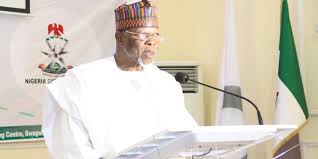
24 Aug DPR, Customs clash over fuel smuggling across Nigeria’s borders
Yesterday at the ongoing interactive session on the Medium Term Expenditure Framework organised by the House of Representatives Committee on Finance, the Department of Petroleum Resources (DPR) has denied claims by the Comptroller-General of Nigerian Customs Service, Hameed Ali, that it refused to cooperate to end the smuggling of petroleum products across Nigeria’s borders.
Ali had alleged that the DPR, an agency in charge of regulating the downstream sector, had been giving licences to petrol stations around the land borders in violation of existing laws.
The Customs boss also accused the DPR of failing to provide the list of all the fillings stations within 20km of the land borders, “both legal and illegal stations”.
Bashir Sodiq, the DPR Head of Downstream, while speaking on Monday, said the Customs boss had been supplied with all the information he asked for.
He promised to provide the committee documents as an evidence to back up his claim.
Sodiq disclosed that following the policy to restrict the supply of PMS to border communities within the 20km corridor, “it was NCS and the Office of the National Security Adviser (ONSA) that were recommending filling stations for exemptions”.
He said, “I am not sure that the information that the CG has is correct. I have the record here. I can remember that when the issue of smuggling of petroleum products was brought up to the DPR, It was by the GMD of the NNPC, in April 2018, he sought a meeting between NCS and ourselves, which we held in the office of the CG customs on April 2018.
“We agree to set up a committee to look at PMS smuggling across the border, and one of the things that the customs requested of us was the list of all the filling stations near the border, which we gave to them. I have the copy of the communication we sent to them. We gave them the list of all the illegal petrol stations. I have a copy stamped in his office. We will send you a copy.
“After that joint border drill initiated by the office of the National Security Adviser, we were directed to stop supplying to filling stations 20km to the border, which we did. I have the circular that we sent to all our offices.
“However, as time goes on, we had a series of communications both from the ONSA and the NCS requesting exemptions. None of these was initiated by the DPR, why? Because of security issue, we felt that smuggling was more of a security issue.
“Whenever we get any request from them, we approve. We have never given any licence to any filling station since. We did an analysis of supply to the border area in the country; it does not amount to three per cent of the daily consumption.”
Ali, had during his appearance before the committee, also informed the committee that the DPR and the NNPC could set up PMS retail outlets in other neighbouring countries, in a bid to curb smuggling.
Speaking to journalists at the end of Monday’s session, James Faleke (APC, Lagos), said the committee would invite the Nigerian Communications Satellite Limited, to supply it with satellite images of the land borders.
He said the figure of smuggled PMS is about 40 million litres daily,
According to him, it will take 1,000 of 33,000 litres trucks to convey the products daily.
Mr Faleke said the trucks would have been captured by the NICOMSAT satellite.
“We are taking the opportunity of MTEF to ask critical questions, because if about 40 million litres of PMS are being smuggled out per day, the question is, how many trucks of 33,000 litres do we need to convey this volume out of the country?
The NNPC is scheduled to appear before the committee on Wednesday.


Sorry, the comment form is closed at this time.